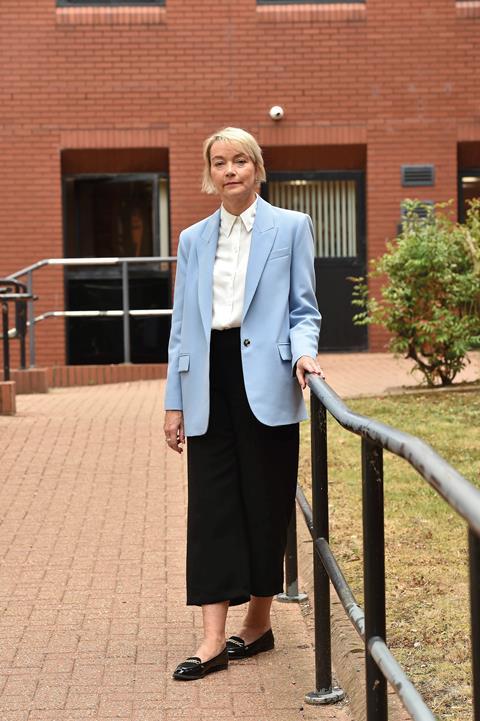Helen Johnson tells Catherine Baksi what it takes to run an ‘Oscar-winning’ legal aid firm. One factor is that working part-time is no bar to partnership
BIOG
Born
1965, Essex
Education
Anglia Ruskin (1983-87)
College of Law, London (1988)
Roles
Articles, Cunningham Haselgrove & Co, Walthamstow (1988-90)
Managing partner, Johnson Astills, established as Emery Johnson (1995-present)
Solicitor advocate (1995-present)
President, Leicester Law Society (2012/13)
Under-sheriff of Leicestershire (2017-present)
Known for
Managing partner, Johnson Astills, regional legal aid firm of the year (2022)
Leicester firm Johnson Astills has come a long way since it was set up in 2005 by two young women solicitors with the help of charity and bank loans. It is now a limited company with 44 lawyers and staff, and last year turned over £2.3m.
In June it was recognised as the best regional firm at the Legal Aid Lawyer of the Year awards, the sector’s ‘Oscars’. The citation read out at the central London ceremony included the words of one supporter: ‘Johnson Astills has helped thousands of parents retain their children. It has represented many, many children so their voices could be heard, and helped innumerable people avoid conviction and possible custodial sentence.’
The firm offers the traditional high street fare of crime, family and child care law, conveyancing, and wills and probate. But walking into the modern, glass-fronted, open-plan office, visitors get the impression that this is no ordinary firm.
In the reception are two large red seats bearing the insignia of Leicester Tigers, the city’s rugby union team. To get to one of the firm’s private rooms, clients pass a replica of the FA Cup, marking Leicester City FC’s victory over Chelsea last year.
Since March, Johnson Astills has been located in the offices of Mattioli Woods – an AIM-listed wealth management company set up by two local businessmen. The company sponsors Leicester Tigers.
Scrolling through Johnson Astills’ website, something else unusual stands out – the absence of any male faces. All of the lawyers and staff, except one apprentice accountant and a recently recruited family solicitor, are women.
It is 5pm. Managing director and higher-court advocate Helen Johnson has just returned from Leicester Crown Court.
Her client, a man in his 40s with no previous convictions, faced 11 charges of sexual assault. The complainant was his 28-year-old stepdaughter from a previous relationship, who alleged that he had abused her when she was a child.

The jury went out at 11.30am. ‘Waiting for a verdict is awful. You feel sick. It never gets easier,’ says Johnson.
At 2pm, they returned, acquitting him of all charges. ‘It would have ruined his life if he’d been convicted,’ she says with relief.
‘When you’re on a trial like that, it’s not good for your family – you’re thinking about it all the time and have lots of late nights.’ Johnson says cases sometimes wake up her up at night.
But she admits that ‘the highs and lows of the job are why we do it. If you’re a trial lawyer, you’re probably a bit of an adrenaline junkie’.
Johnson gained higher rights of audience in 1997 and in 2015/16 won Solicitor Advocate of the Year at the Law Society’s Excellence awards.
Local judges, she says, have been very encouraging. And Johnson has become ‘enough of a feature’ that the bar has got used to her. However, she reports negative experiences and prejudice from a few ‘out of town’ judges.
In one trial, the judge’s unpleasantness provoked support from the other advocates – all male barristers. She recalls they had a case dinner without the judge.
Johnson abandoned her resistance to wearing a wig in court after receiving a jury question asking why she was the only advocate in a multi-handed drugs case not wearing one.
She now wears a wig given to her by friend and mentor Adrienne Lucking QC, the presiding judge at Northampton Crown Court, which Johnson will in time pass on.
In two of her most high-profile cases, Johnson was led by Ali Bajwa QC. The first, at London’s Old Bailey, was the case of a teenager accused of plotting terrorist attacks in Loughborough in 2013.
Michael Piggin, 16, was diagnosed with Asperger’s syndrome after his arrest. He pleaded guilty to stockpiling weapons but denied intending to carry out an attack, insisting that he wrote about attacks to cope with bullying and tested explosives ‘for entertainment’.
Johnson, who did 50% of the advocacy, praises Bajwa for his encouraging approach. ‘It was a great learning experience for a junior advocate, being treated as an equal, and unusual to have a QC who was so enabling,’ she says.
‘Piggin was prosecuted as though it was the worst case ever,’ recalls Johnson. She insists that he was a mixed-up kid with an undiagnosed psychiatric condition, who felt alienated and used sparklers to make explosives. A jury at Piggin’s retrial failed to reach a verdict on terrorism charges. Piggin was detained indefinitely under the Mental Health Act.
Shortly afterwards, Johnson and Bajwa were back together at Nottingham Crown Court for the two-month trial of eight defendants charged with killing a mother and her three children in a botched revenge arson attack on the wrong home in 2013.
They represented the youngest in the group, 17-year-old Cairo Parker. He was convicted of manslaughter and sentenced to eight years in prison.
Two were convicted of murder and given 35- and 25-year prison terms respectively. The other five were convicted of manslaughter and jailed for either 15 or 12 years.
Helping children to be heard
Johnson Astills won the best regional firm/not for profit agency at the 20th anniversary Legal Aid Lawyer of the Year awards, at a ceremony in central London in July. Scooping the award, in the category which was sponsored by the Legal Education Foundation, the firm was shortlisted alongside Ashwood Solicitors in Manchester and David Gray Solicitors in Newcastle upon Tyne.
The citation read out at the event said: ‘This Leicester-based firm is known for its expertise in criminal defence, family, and child care law, and many of its lawyers are nationally recognised for their expertise. Its criminal team handles a whole gamut of cases, including terrorism, murder and drugs-related offences. 95% of its advocacy is done in-house. Its family team have strong links to local women’s support groups and domestic violence charities.’ One supporter who nominated the firm said: ‘Johnson Astills has helped thousands of parents retain their children. It has represented many, many children so their voices could be heard, and helped innumerable people avoid conviction and possible custodial sentence.’
In 1995, two pioneering solicitors, Helen Johnson and Lesley Emery, founded Emery Johnson. With loans from the Sir Thomas White Charity and a bank, the pair rented offices at Welford Road and Emery Johnson became Leicester’s first all-female partnership. It specialised in criminal defence and care work on behalf of families involved with social services.
In 2010, the firm acquired an office in Loughborough and in 2013 joined forces with Astills, a private client practice founded in1947, that did wills and probate, conveyancing and matrimonial work, making it one of Leicester’s leading law firms offering a wide range of services. In anticipation of its 25th anniversary in 2020, the firm changed its name to Johnson Astills, retaining its teal blue branding.
The only way
Johnson was born in 1965 in Essex, where she grew up. Her mother was a legal secretary in a large City law firm and her father was a Fleet Street printer, working for the Telegraph and Sunday Times.
Unsure what career to pursue, she secured a place at Anglia Ruskin University to study art history, but switched to law, still unsure where it would take her. She completed the Law Society Finals at the College of Law in London and did articles at Cartwright Cunningham Haselgrove & Co in Walthamstow, east London, undertaking only civil law seats.
One of the partners was female and Johnson recalls attending Essex Law Society dinners with her in the late 1980s. She remembers looking round at a sea of men, thinking ‘how do I fit into this?’.
Still unsure if law was for her, after qualifying in 1990, Johnson went travelling. Returning in 1992 to find the UK economy in recession, she struggled to find a job. The only vacancies were in criminal law, which she had never done. Despite her lack of experience, she was offered two jobs – in Liverpool and Leicester – and opted for the latter.
‘Crime turned out to be what I loved doing and I wouldn’t want to do anything else,’ Johnson says. Back then, she explains, solicitors could gain higher rights of audience based on their experience, and conducting old-style committals helped her achieve that in 1997.
At school, Johnson had thought of becoming a barrister. But was put off by a female barrister at a careers fair who cautioned against it unless Johnson's family had money and legal contacts.
‘It’s ironic because I’m doing that job now,’ she says. ‘Being a solicitor advocate probably suits me better, because I like the slightly more personal relationship with clients.’
Five years after qualifying, Johnson and a former colleague and child care solicitor, Lesley Emery, decided to set up their own firm.

‘We both didn’t want to go into partnership at any of the other firms,’ Johnson says. ‘They were very male and not very management-focused.’ Johnson was 29 and a single parent with a three-year-old son. Emery had just got divorced. The pair had no money.
‘I applied for a £9,000 interest-free loan from a charity that you could repay over 10 years, and we got a £7,500 business loan,’ recalls Johnson.
The pair rented an office on Welford Road and in 1995 Emery Johnson became Leicester’s first all-female partnership, employing a secretary and a paralegal.
The plan was that the fees from Johnson’s criminal work, which paid regularly, would sustain cashflow, while Emery’s better but slower-paying child care practice would then keep them afloat.
They took pay cuts and Emery helped to look after Johnson’s son. ‘Looking back, we were a bit crazy, but we made it work and were fairly quickly back to what we were earning and started employing more people,’ says Johnson.
In 2010, the firm acquired an office and criminal contract in Loughborough. Then in 2013 it joined forces with Astills, a private client practice founded in 1947 that did wills and probate, conveyancing and matrimonial work.
Some thought that merging with such a different practice was ‘crazy’, but Johnson says it worked, in part because her firm needed to become less reliant on increasingly poorly paid legal aid work. Around 80%-90% of its income had been publicly funded, a proportion that they wanted to cut to 50%.
'We both didn’t want to go into partnership at any of the other firms. They were very male and not very management-focused'
Today, around 20% of the firm’s work is crime. To make it pay, Johnson says 95% of advocacy is kept in-house and the firm does increasing amounts of privately paying cases, including road traffic cases – a trend she expects to continue. Its family and children work is also a mix, ranging from publicly funded care cases to privately paying divorce work for wealthy clients.
The firm rebranded in 2020, becoming Johnson Astills.‘We’ve had to change and adapt, and have always tried to stay a bit ahead of the game,’ says Johnson. Just before the pandemic, the firm moved to host its systems in the cloud to enable remote and flexible working.
The firm did not set out to be female-dominated and does not market itself as such, says Johnson – ‘it’s just how it is’. After Emery’s departure, Emma Mitchell joined in 2000, adding family law to its service and, says Johnson, most of the applications come from women.
‘We just employ the best people for the job,’ she insists. But Johnson attributes its popularity with female applicants to the fact that women want to work for female managers, as well as its flexible, family-friendly working arrangements.
‘People can see that we had children, we’ve promoted women with families and that working part-time isn’t a bar to partnership,’ says Johnson. She notes that one partner was promoted while on maternity leave.
Though the gender imbalance is unintentional, Johnson suggests that it does create a different vibe that makes a positive difference to employees. ‘Perhaps because we’re women, we are very team-orientated,’ she says, noting that several targets are team-based, rather than individual.
Staff feedback, she adds, suggests that Johnson Astills is more receptive to employee ideas than male-run firms that they have worked for. ‘One employee said that working here was like a breath of fresh air,’ she says.
As a result, it generally has good retention rates. Each year, the firm takes on two trainees in the hope that they will stay and become the associates and directors of the future.
'People can see that we had children, we’ve promoted women with families and that working part-time isn’t a bar to partnership'
But, in common with other local firms, newly qualified solicitors are being ‘lured away by firms throwing crazy money at them’, as well as the Crown Prosecution Service and local government.
The ‘massive challenge’ posed by the pandemic prompted ‘difficult staffing decisions’. But Johnson, who juggles full-time fee-earning with management, reports a positive last three years – thanks in part to a well-timed receipt of funds from a big Crown court case.
The national backlog of almost 60,000 cases creates difficulties for clients, says Johnson. With the longest wait for concluding sexual offence cases, Leicester Crown Court is making efforts to list them more speedily.
She supports the criminal barrister strike but says it is affecting progress. Johnson reports that when she did a privately paying trial in the first week of the full walk-out, of the six courtrooms at Leicester Crown Court, only hers was sitting.
Community roots
Located in the heart of the city, a short walk from the Crown, county, magistrates’ and youth courts, the firm is rooted in the local community.
Johnson is under-sheriff of the county and in 2012 served as president of Leicester Law Society. She says the small, friendly city has an active and lively legal scene among the busy, competitive firms. ‘We were proud to bring the [LALY] award back for Leicester,’ says Johnson.
Although she is the founder and the firm bears her name, Johnson stresses: ‘It’s not all about me. It is a team. I couldn’t do it on my own and like to think we give people the opportunity to come here and shine.’
On whether she would become a judge, she says: ‘I suppose I should because I’m female and a solicitor advocate.’ But she is concerned that it would be a lonely job, observing ‘the thing I get pleasure from is collaborative team-working’.
To balance her ‘full-on’ job, she stresses the need for ‘proper holidays, reading on a beach or looking at something ancient, to recharge the batteries’. But she admits to keeping her mobile phone on and casting an eye over email.
Catherine Baksi is a freelance journalist
































No comments yet